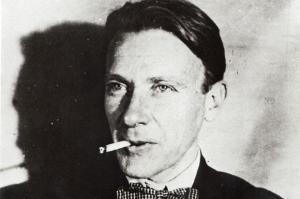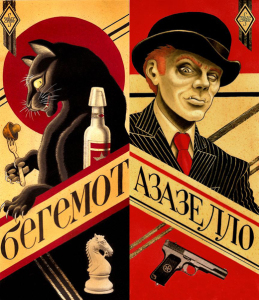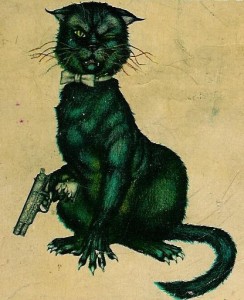A few years ago, I was absorbed in a book at a bus stop when a man materialised in front of me. Grinning, the stranger leant in so close that our noses almost touched.
“Good book?”
It’s fortunate he took me by surprise, because I could well have spoiled his pickup artistry with, “Sure is! It’s about Satan.”
“Follow me, reader! Who told you that there is no true, faithful, eternal love in this world! May the liar’s vile tongue be cut out! Follow me, my reader, and me alone, and I will show you such a love!”
Mikhail Bulgakov’s The Master and Margarita is one of those books I thrust at people like a zealot. “No, really. You need this. You. Need. This.” The Devil’s minions – a joker with a pince-nez, a thug, and a wise-cracking, vodka-swilling cat – wreak havoc across 1930s Moscow. If that doesn’t excite you, you’re beyond help.
Now considered a twentieth-century classic, The Master and Margarita was nearly lost to history. A jab at Russian state-sanctioned atheism and the stranglehold of Soviet bureaucracy, the novel is laugh-out-loud-in-public-like-a-lunatic funny, yet heartfelt and romantic, a channel for Bulgakov’s frustration and depression. Juxtaposing his contemporary Russia with Biblical Jerusalem, the story demonstrates Bulgakov’s keen intellect and interest in ethics and questions of personal freedom – all of which could get a writer killed in Stalin’s Russia.
Shortly after kicking a morphine habit in 1919, Mikhail Bulgakov gave up his life as a country doctor to write full-time (just as well, considering he managed to rip out a sizeable chunk of a man’s jaw during a tooth extraction). He enjoyed early success with his plays and short stories before finding his niche, blending merciless political satire with the fantastical. Then, in the 1920s, censorship caught up with him. Stalin personally banned Bulgakov’s play The Run, and the rest of his work, if not banned outright, received brutal criticism for making fun of the Soviet regime.
Surreally, Stalin was a fan of Bulgakov. Allegedly, he saw The White Guard performed 15 times and went so far as to step in and protect him from his harsher critics, claiming dangerous political jargon like ‘counter-revolutionary’ was beneath a writer of such calibre. Bulgakov must have felt in league with the Devil.
The censorship took its toll on Bulgakov’s mental health. As a medical man, he knew he was likely to die young of hereditary kidney disease, and his life’s work was being ‘killed’, as he put it, within his lifetime. In a staggering moment of chutzpah, Bulgakov wrote to Stalin – mad Stalin, Stalin of the Gulags and the purges – demanding to be taken off the blacklist or allowed to leave the Soviet Union. Stalin let him resume his day-job the Art Theatre. But Bulgakov was a watched man, increasingly bitter and depressed. The manuscript he had been working on since the 1920s – the one that would eventually become The Master and Margarita – worried his family and friends. It was an impassioned treatise on artistic and spiritual freedom, and the satire was razor-sharp. Everyone privileged enough to be shown a glimpse loved it, and everyone knew it would never see the light of day.
In a fit of despondency, Bulgakov burned his only draft and was forced to rewrite from memory. This drastic act is one of the autobiographical details that make the story so compelling – in the rewritten novel, The Master burns his magnus opus only to have it returned to him by the Devil. “Didn’t you know that manuscripts don’t burn?”
Bulgakov never saw his masterpiece published. After his death at 49, his wife Elena strove to find a publisher who’d agree to work with such dangerous material. In the end, she could only persuade a small periodical to release the novel in serial form, twenty-six years after the author’s death.
“‘What’s its future?’ you ask?” Bulgakov wrote. “I don’t know. Possibly, you will store the manuscript in one of the drawers, next to my ‘killed’ plays, and occasionally it will be in your thoughts. Then again, you don’t know the future. My own judgement of the book is already made and I think it truly deserves being hidden away in the darkness of some chest…”





I keep meaning to read this, and very nearly bought a copy the other week when I found it in a charity shop. It does sound rather good. We studied 20th century Russia in my A-level History classes, and that along with being a Manic Street Preachers fan means I do have a bit of a “thing” for Russia. For heaven’s sake, the book has a vodka-drinking cat in it. And Satan. How can this not be good?!
I think you’d love it. The parts with Jesus talking to Pontius Pilate are interesting, too, as his father was a theologian.
I’ve got an edition with a bit in the back explaining all the jokes that won’t make sense to anyone who isn’t from the Soviet Union. Very helpful. I think it’s the Wordsworth edition. He had a way of slagging off real people he knew, too, so it explains all of that.
I’d *love* to go to the Bulgakov museum(s) in Russia, but flights are so expensive. We should start a Kickstarter for a Very Important Literary Field Trip And Also Soviet Kitsch Shopping.
Pingback: Minipost: The Master and Margarita by Mikhail Bulgakov – Thoughts, Tales and Tea.